COMO Laucala Island, Fiji
Oprah Winfrey, George Clooney and Arnold Schwarzenegger have all stayed here, and it’s only five hours from Australia.
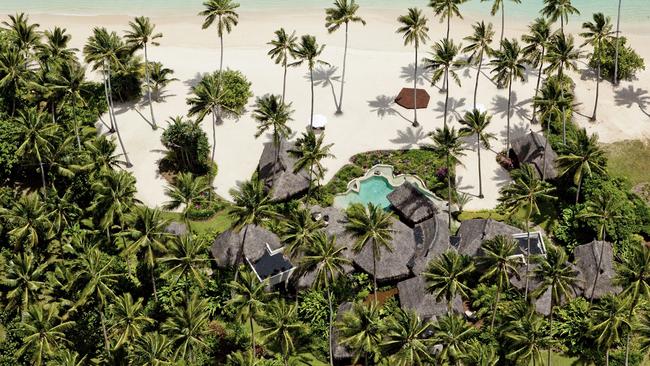
It is after dusk when we step from our eight-seater jet. The balmy evening is filled with the sound of clapping hands, strumming guitars and joyous shouts of “Bula!” as glossy green leaf garlands of welcome are slipped over our heads. Bags are whisked away and we sip on fresh coconut juice, exchanging names with the beaming reception team before we’re ushered towards 4WDs that transport us through lush jungle.
We skirt a championship golf course nestled in a Jurassic-like setting and pass a marina where a flotilla of pleasure boats lies waiting to help us explore the surrounding seas. The flames of tiki torches dance around a beachfront restaurant, and a glass-fronted lap pool glitters in the centre of a constellation of pools spilling through gardens towards the beach.
And then we reach our villas. Ah, the villas. Dotted discreetly along white sand beaches and ridge lines that overlook the sea, each of the 25 thatched residences is a serene retreat in its own right, set within at least 2000sq m of tropical gardens featuring day beds and a private pool. Surely there can be no better way to immerse yourself in the luxury of one of the world’s most exclusive resorts, Fiji’s COMO Laucala Island.
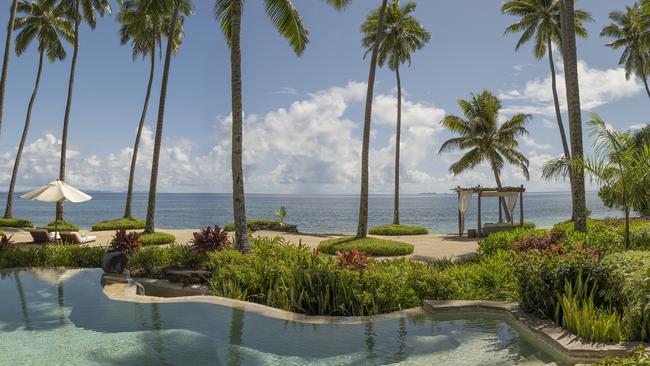
Around the globe, hundreds of private islands are scattered like gems across ink-blue seas, many home to luxurious resorts. Among these, Laucala prevails, consistently rating as one of the top private island retreats and attracting an A-list of wealthy holidaymakers including Oprah Winfrey, Elle Macpherson, Arnold Schwarzenegger and George Clooney.
It’s a status partially achieved through the simple metrics of supply and pricing. With only 25 villas and a tariff that starts at $US5600 ($8050) a night before tax, the resort is remarkably spacious and unreservedly exclusive. But in a field increasingly filled with generically styled luxury hotels, Laucala also distinguishes itself by delivering a holiday that captures the beauty of Fiji and its people at every turn. It’s an experience that’s clearly addictive; during our stay, we meet an Australian family of four on their 10th visit.
Laucala’s luxury transformation came after Red Bull co-founder Dietrich Mateschitz purchased the northern Fijian island from the family of US media magnate Malcolm Forbes in 2003. Forbes, who died in 1990 and loved Laucala so much his ashes were buried here, operated the island as a coconut plantation for decades.
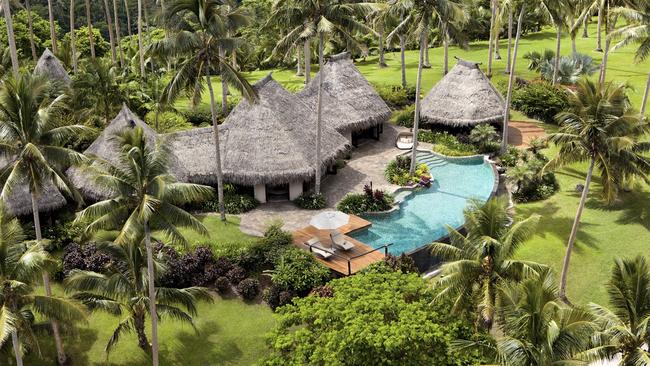
Mateschitz had a different vision, removing the plantation and employing a team of architects to create an idyllic resort at the tip of the remote 1200ha island, with a small suite of accommodation that includes his own luxurious hilltop estate (available only on application for $US45,000 a night).
While guest numbers on Laucala may be low, staff numbers are anything but. A staggering 370-strong workforce, including 90 villagers from neighbouring islands and a team of taus (Fijian for friends) who play a relaxed butler-like role, keeps the resort in immaculate condition.
It’s my tau, Jope, who welcomes me to my beachfront plantation residence, smiling broadly as he walks me through and links my phone to a tau WhatsApp group, on standby around the clock to assist guests.
On one side of the abode’s stone-paved entrance, Jope shows me through an inviting living room with a large cushion-covered lounge, smart TV, generously stocked wine fridge and a sideboard topped with a row of sparkling spirit-filled decanters. Across the entranceway, in a separate thatched building, are my sleeping quarters. A sunken living area with a deep white lounge lies in front of a kingsize bed, while a spacious dressing zone leads to an enormous round bathroom featuring an oversized stone tub.
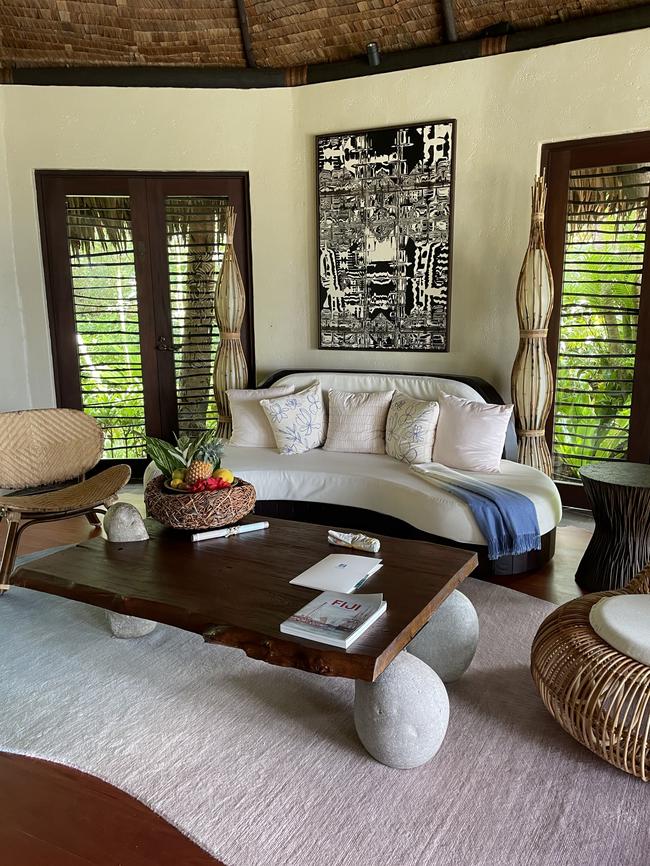
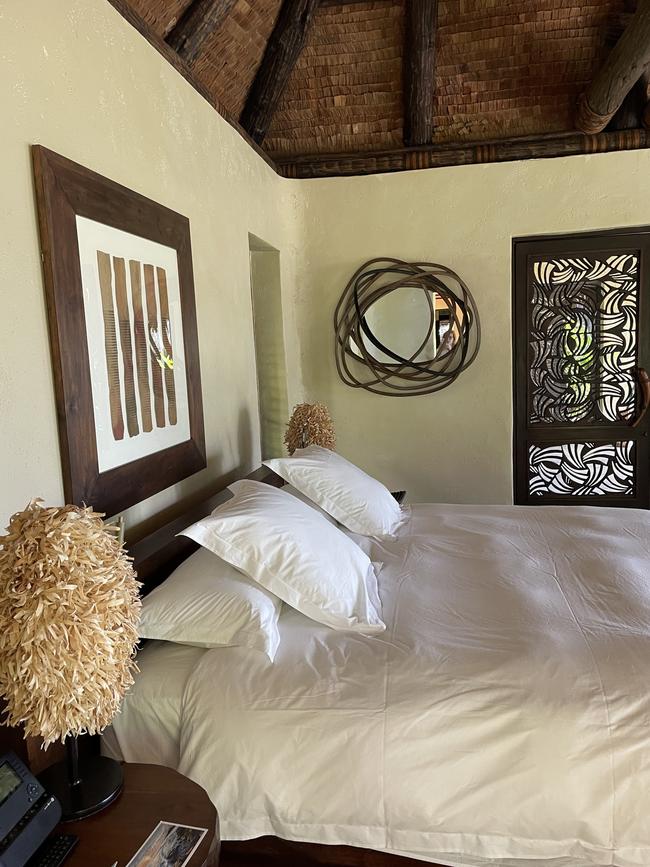
French doors open to a second bathroom set outside among tropical plants, as well as one of three day beds dotted across the dwelling.
While native birds flit through the gardens and coconut palms fringe the raked sands of the beach that stretches next to my pool, I don’t need to look outside to know I’m in Fiji. Many of the furnishings are made from local stone and timber, and the ceiling features thick wooden beams bound with a traditional coconut-husk twine known as magimagi. A beautiful chandelier made from magimagi and tortoiseshell discs mimics the jellyfish found in the surrounding ocean, and conical bedside lamps are decorated with the papery bark of local vau trees. Even the villa’s smell captures its setting; a tray of shredded leaves from the Fijian uci plant fills the air with a refreshing menthol fragrance.
The decor is muted in shades of cream, caramel and deeper browns that sit easily in the natural environment, and much of the furniture is curved, reflecting Mateschitz’s preference for soft edges and free-flowing shapes over straight lines.
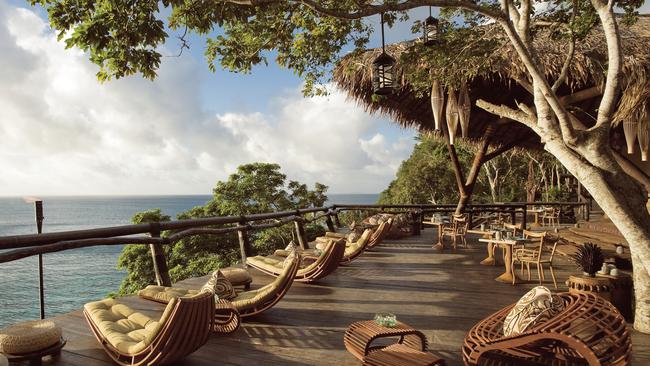
It’s a penchant I’m reminded of as I steer my personal electric buggy along the resort’s winding paths. Quiet and eco-friendly, these vehicles are the perfect way to navigate the undulating grounds, although we’re warned to watch out for frogs and mudcrabs that threaten a uniquely South Pacific brand of roadkill once night falls.
Activities are not prescheduled but it seems almost anything is possible, with the ever-friendly staff on standby to help guests enjoy the island’s offerings. Sadly, Laucala’s mini-submarine is out of service during our stay, but there’s a bevy of boats ready to take us wakeboarding, fishing or diving in gloriously warm blue seas.
One evening my group of six heads out on a Riviera motor yacht for a magnificent Champagne sunset at sea. The next afternoon three of us hop on a boat to snorkel over colourful coral, shouting excitedly as a turtle joins our reef party. While we’re at sea, two others from our posse drop by on jet skis, partway through a 22km circumnavigation of the island. Another morning we watch a fellow guest kite surf as we play golf. The challenges of the David McLay-Kidd designed course, considered one of the best in the South Pacific, are assuaged by breathtaking ocean views.
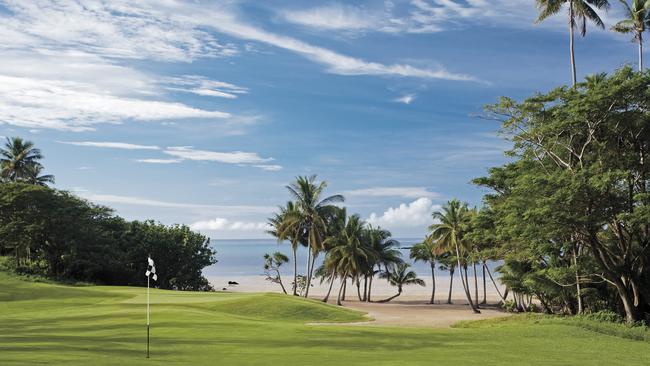
Private beach picnics and horse riding on the shore are easily arranged and each guest receives a complimentary massage in the glorious COMO Shambhala Retreat, set within an oasis of lily-covered ponds.
Also on offer is a tour of COMO Laucala’s farm, which reveals just how impressively self-sufficient the island is, with more than 80 per cent of its food sourced locally. While the resort buys produce from local farmers wherever possible, Australian chef Daniel Boller grows a selection of fruit, hydroponic vegetables and herbs, and oversees a menagerie of more than 300 chickens, hundreds of contented cattle, including wagyu, and pens of healthy pigs. The last are the source of Boller’s delicious “homegrown” pepperoni served on sourdough pizzas, one of many culinary delights to be enjoyed in five restaurants and bars scattered in breathtaking settings across the property.
One night we sit under the Beach Bar’s soaring thatched pavilion roof, toes wiggling in the sand as we savour meats cooked in a lovo earth oven and listen to a group of Fijian staff crooning a repertoire of traditional songs and soulful contemporary covers. The next evening, we’re gathered around an open-air teppanyaki grill at the clifftop Seagrass restaurant, local lobster steaming under a cloche on the hotplate as waves roll on to rocks far below.
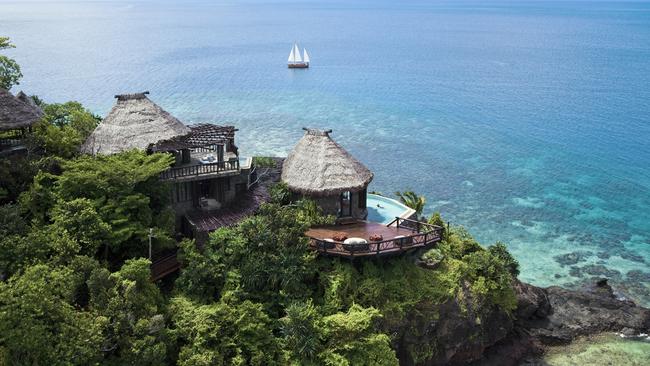
Then there’s a degustation menu at the colonial-style Plantation House, where those who want to explore beyond the 120 wines on the resort’s inclusive list can choose from a special cellar that extends to bottles of Chateau Petrus priced at about $US5000. Looking out over a coconut palm-studded lawn, Plantation House is also a peaceful setting for breakfasts featuring fresh juices and flaky chocolate croissants that embed themselves in my dreams.
But COMO Laucala Island is full of many experiences that are hard to forget, particularly time spent enjoying the happy laughter and gentle spirit of the Fijian people.
As our plane taxis down the island runway, my mind returns to a morning stroll through the gardens with one of the Laucala team, Waisele, who shares his knowledge of the native plants. Pointing out fruits used to counter heart disease and leaves that can stop toothache, Waisele talks about life on Laucala and its neighbouring island, smiling as he recounts how a guest once asked his uncle how villagers could get rich, given their practice of subsistence farming.
His uncle, Waisele says, simply tapped at his heart and responded: “Rich is here.”
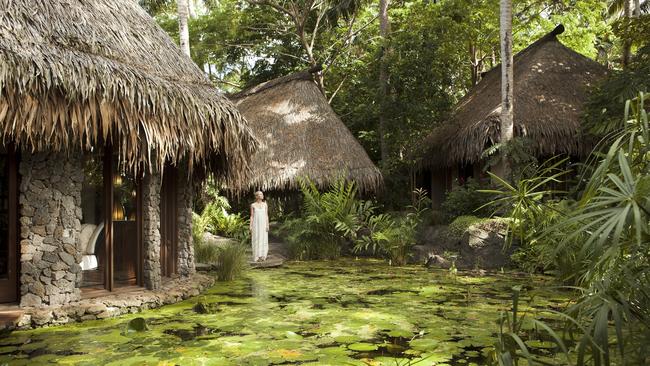
In the know
COMO Laucala Island rates start from $US5600 ($8051) a night plus taxes for a one-bedroom plantation residence with private pool. Rates include all meals and an extensive range of wines, champagne and spirits; a one-hour COMO Shambhala massage for each adult guest and an array of activities, including golf, water sports and horse riding.
A 50-minute jet transfer between Laucala and Nadi International Airport is $US750 for adults and $US565 for children one-way.
More to the story
For many years Laucala Island was so private, guests were vetted and a password was required to view its website. Last December its owner, 78-year-old Red Bull co-founder Dietrich Mateschitz, appointed luxury hotel and resort firm COMO to manage the property. Although the website is decidedly more accessible under the COMO banner, the brand is being careful not to rock the boat, conscious that more than 50 per cent of business comes from loyal repeat guests. The island’s new general manager, Gary Henden, says while the resort already has a strong sustainability platform, COMO is looking to inject more of its signature Shambhala wellbeing philosophy into the menus and spa and to reinvigorate the island’s farm.
Libby Moffet was a guest of COMO Laucala Island and Tourism Fiji.

To join the conversation, please log in. Don't have an account? Register
Join the conversation, you are commenting as Logout